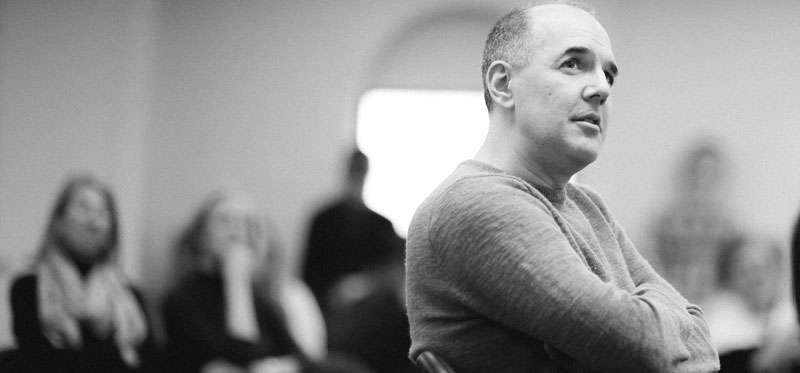In Conversation with David Auburn

Long before he wrote Proof, playwright David Auburn was a student at the University of Chicago, where he wrote short comic sketches for Off-Off Campus, the university’s improv and sketch comedy group. Mr. Auburn spoke to Court’s Resident Dramaturg, Drew Dir, about being one of the U of C’s most celebrated alumni authors.
When you first came to the University of Chicago as a student, did you have alternate career plans besides becoming a playwright?
DA: I had no idea I wanted to be a playwright. I was a political science major. I think I imagined in some vague, not-very-well-thought-out way that I wanted to work in international aid or development.
And when did that change for you?
DA: I got involved with Off-Off Campus, which was the [comedy] revue troupe [at the UofC]. I found that I liked writing short comic sketches, and performing in them, and it gradually took over my life. [By the time I was a second year] we had put together a show that we were taking to the Edinburgh Fringe Festival. I remember being on the plane waiting to take off and thinking: “This is what I want to do. I want to try and write for the theatre.” In retrospect a lot of what I know about playwriting comes from writing those revue sketches. You develop a rough toolbox of techniques that apply very nicely when you try to write longer things.
Do you remember the first time that you wrote something really good? The first time you were 100% proud of your writing?
DA: I doubt it was particularly good, but I do remember the first time I wrote and performed in a sketch that got a big laugh. I don’t even remember the sketch, but I do recall the distinct feeling of sitting up on stage in one of those bent-wood chairs and saying a line and feeling a wave of laughter rolling at me and the headiness of that—it was something of a different order than just saying a funny line in a play that somebody else had written.
In the play Proof, your character, Hal, describes the pressures on mathematicians to publish and make discoveries early in their career. Did any of that come from a personal anxiety about being a writer in the theatre? Did you have a deadline for yourself, as in: “I must produce something great by this age”?
I felt hungry to get work done and to write a lot and to be active in the world; I don’t know that I felt any particular age pressure. What I’ve learned, of course, is that it gets easier and more interesting the longer you do it—in that you have more things to say and more ways to say them as experience accumulates.
How did you go about depicting those mathematician characters—did you talk to real mathematicians? What were the strategies you used for making the professional details in the play feel plausible?
DA: I I had known mathematicians in school and I had friends who did it. After I’d written a draft of the play I sought out a couple of people who agreed to read it, and then had conversations with them about what was plausible or not. We always brought in math people to talk to the Broadway casts. Often in pairs; they would get into arguments or disagreements—sometimes fundamental ones. That was useful for the actors, who came away with a sense that this wasn’t a dry, technical field—that this was something that engendered real debate and humor and passion among the people who did it.
When you’re writing, what is your favorite part the process—is it starting the project, conceptualizing it; is it the tinkering and the edits; or is it just finally seeing it realized on stage?
DA: I don’t dislike the process of grinding it out on the page, though that varies – you have some good days at your desk and other days you want to defenestrate yourself. But if I had to pick a favorite part of it, I love the early days in the rehearsal room with the actors. The first few times you’re hearing it read and you start to see what some of the possibilities are, and some of the flaws are, and you have this sense of a thing you’ve made that’s still very molten and alive and in the hands of other people as well as you—I enjoy that.
When you were a student at the U of C, on any given Saturday night, what were you up to?
DA: I went to hear a lot of music; that was one of the things I liked about Chicago. Not every weekend, but many weekends I would be downtown at a show, at a place like the Metro, or Lounge Ax. Either that or going to the theatre—I went to everything that Steppenwolf and the Goodman and Remains and Theatre Oobleck and all of these wonderful theatre companies did, and I found that a very rich experience. I came from Little Rock, which isn’t a small town but it ain’t Chicago, and getting to Chicago and opening the Reader and seeing what was on that night, I felt like a kid in a candy store. ◼
Photo of Playwright David Auburn by Joe Mazza.